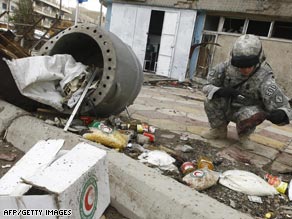
Suicide bombers in Iraq launched two deadly attacks Thursday, killing at least 45 people in Diyala province and at least 28 in Baghdad, an Iraqi Interior Ministry official said.
An attacker set off a suicide vest at a restaurant in Imam Wais, a Diyala provincial security official said. The area is about 43 miles (70 kilometers) northeast of Baquba, capital of the sprawling province that is north and east of Baghdad. The Diyala bombing, which targeted Iranian pilgrims, also wounded 28, the Interior Ministry official said. The Diyala security official said the pilgrims — who had been visiting Shiite shrines — stopped for lunch at the restaurant when the attack occurred. Many pilgrims were among the casualties, and the restaurant collapsed after the bombing, the security official said. In central Baghdad, a bomber clad in a suicide vest attacked a crowd of national police, killing 28 police and civilians and wounding 52. Police had been helping the Red Crescent distribute aid to displaced families in the Karrada district. Despite the declining levels of violence in Iraq over recent months, the latest strikes reflect what appears to be a slight uptick from March to April of assaults on civilians, U.S. and Iraqi security forces, and the U.S.-backed militias called Awakening Councils or Sons of Iraq.
Don’t Miss
Raids hit former insurgent hot spot
Suicide bomber kills 9 in Iraq
Abu Ghraib chief says memos are vindication
On Wednesday, five people in Salaheddin province were killed in a suicide bombing, and a police officer was killed in Baghdad in a hand grenade attack. Also, an American soldier died of wounds suffered while conducting a patrol in eastern Baghdad. The violence comes as the Obama administration is working to withdraw American combat troops from the country’s urban areas by June 30 and eventually remove all troops from the country by the end of 2011 in accordance with the security agreement the United States and Iraq reached last year. However, the top U.S. commander in Iraq, Gen. Raymond Odierno, told CNN on Wednesday that the Iraqi government may decide to allow boots on the ground in some urban areas past June. Odierno said he believes troops will withdraw from volatile Baquba but noted that Iraqi Prime Minister Nuri al-Maliki will have to make a decision about Mosul — where al Qaeda in Iraq militants have been active. “We’ll see. You know, it’s still two months away, so we’ll have to see what progress we’re able to make, but that will be a joint assessment between us and the Iraqis,” Odierno said. Odierno said there have been a couple of high-profile violent events this month, but the number of incidents hasn’t gone up. He said he is pleased with security progress. “I don’t see any trend of increased violence yet,” he said. “I still want to get rid of the al Qaeda capability to conduct high-profile attacks, and we have not yet been able to completely finish that. So we still have some work ahead of us.” Odierno said he is concerned about the chances of political violence, including the spillover of tensions in the north of Iraq between Kurds and Arabs. He urged Iraqi leaders to pursue political negotiations and accommodation. “I would still like to see political progress,” Odierno said. Thursday’s attacks came on the same day Iraq’s military announced the capture of a top al Qaeda in Iraq leader. Iraq State TV, quoting a general, said Omar al-Baghdadi, head of an al Qaeda umbrella group, was seized in Baghdad during a major military operation. The U.S. military has not yet confirmed the development. Two years ago, there were erroneous reports that al-Baghdadi had been captured and killed.